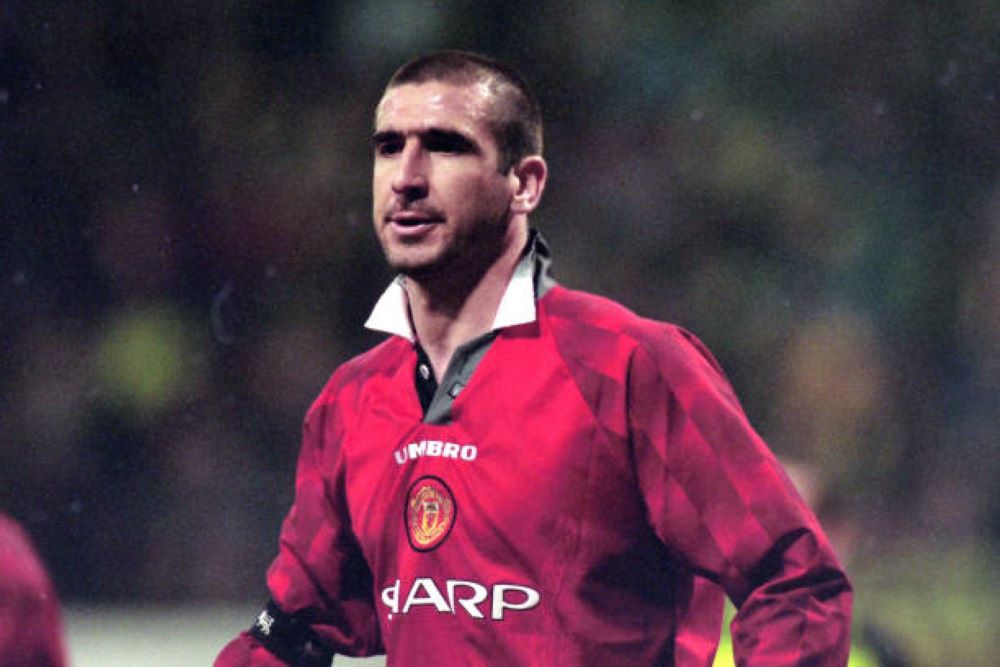Why Eric Cantona should be in the EPL Hall of Fame
“Being French, to me, is first and foremost being a revolutionary” – Eric Cantona.
The Hall of Fame nominee is more renowned now for his Kung Fu kick at Selhurst Park in early 1995, or maybe even his philosophical speech in the 2019 Champions’ League group stage draw – it feels like Eric Cantona has been reduced to a personality. Nevertheless, with his collar turned up, back straight, chest stuck out, Cantona popularised technical football. Cantona popularised the Premier League.
Regarded as one of the greatest footballers of his generation, Cantona combined his 6-foot-2 frame with incredible technical ability. He flourished in space between the opposition’s midfield and defence, using the time it gave him to orchestrate Manchester United’s next attack. If his height didn’t already make him stand out, his creativity certainly did. He was different to every other Premier League footballer.
His start in English football was turbulent, as a miscommunication with Sheffield Wednesday manager Trevor Francis meant his only appearance for the Owls was an 8-3 loss in a six-a-side friendly against the Baltimore Blast. However, just an hour north on the M1, Cantona signed for the eventual champions of the 1991/92 season, Leeds United.
Despite having notched just 15 appearances that season, Cantona became a cult-hero. While only scoring three goals, he became known for his assists for Leeds front-man Lee Chapman.
Leeds did not suit Cantona, however. Howard Wilkinson, their manager, did not trust foreign players. No other managers in English football had really deviated from the norm either. In the 1991/92 Football League First Division, all ten top scorers were British. Wilkinson abruptly stated: “There will be no French revolution because that, in our football terms, would inevitably suffer a defeat.”
Cantona was the catalyst for a United revolution
Leeds’ constant barrage of ‘long-balls’ resulted in Cantona simply being bypassed in many attacks. He was dropped towards the midway point of the inaugural Premier League season, and a furious Cantona requested a transfer.
An injury to youngster Dion Dublin had required Alex Ferguson, manager of Manchester United, to shop around for a new striker. Rebuffed over players such as fellow Hall of Fame nominee Matt Le Tissier and David Hurst, the eccentric Cantona signed for the small fee of £1.2 million after a chance conversation when Leeds were rejected in their enquiry about the availability of United full-back, Denis Irwin. The purchase of the Frenchman revolutionised and overhauled United’s tactical approach overnight.
Cantona was the catalyst for a United revolution. He joined in early 1992 when United were eighth in the table. The season ended with Manchester 10 points clear at the top. Used in a number 10 role, he became one of the English games’s first deep-lying-forwards, playing in the hole behind the more advanced ‘number 9’.
While potent abroad with the likes of Diego Maradona and Ferenc Puskás, the English game was more about tricky wide-men and midfielders who burst into the opposing box. Cantona was able to orchestrate each United attack. He was a selfless footballer who used his individual brilliance to benefit those around him.
Sir Alex Ferguson has stated that “he illuminated Old Trafford. The place was a frenzy every time he touched the ball”, a phenomenon seen in the crowd’s reaction after his lob against Sunderland in 1996. He was an enigma inside Manchester, a character not seen since George Best. “[Old Trafford] was his stage. He loved it; the crowd loved him,” wrote Roy Keane later in his life.
While Cantona didn’t inspire players to work hard, he made it “acceptable to do so”
– Phil Neville
To the press the Frenchman posited himself as a puzzled outsider, incapable to string a complex sentence together. However, to his teammates he spoke English well, a satirical character in the dressing room. He also became this excellent example in training. His work-ethic inspired the club’s new emerging youngsters, now known as the ‘Class of 92’, including David Beckham, Nicky Butt, Paul Scholes and both Gary and Phil Neville, considered widely to be the greatest cohort to ever be produced from a football academy.
As Phil Neville has stated, while Cantona didn’t inspire players to work hard, he made it “acceptable to do so”.
In the four and a half seasons he spent with Manchester United, they won the title four times, only missing out in the season he served a nine-month suspension due to his ‘kung-fu kick’. His 126 goal involvements in 156 appearances in the Premier League showcase the excellence he showed on the football pitch. The 4-4-1-1 became a staple in the Premier League’s first decade thanks to Manchester United’s dominance – however the hardest task for teams was finding their Cantona.
Cantona sadly retired in 1997 at the age of just 30, but his five-year stint in the Premier League may just be the best five we have ever seen. He is surely a shoo-in for induction into the Hall of Fame, as we shouldn’t forget his incredible presence on the football pitch, although what is if anything what is more memorable is his character of it. As Cantona stated: “My best moment? I have a lot of good moments but the one I prefer is when I kicked the hooligan.”

Comments